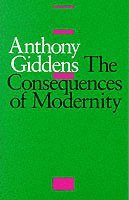
- Format
- Häftad (Paperback / softback)
- Språk
- Engelska
- Antal sidor
- 200
- Utgivningsdatum
- 1991-04-01
- Upplaga
- New ed
- Förlag
- Polity Press
- Illustrationer
- 0
- Dimensioner
- 217 x 138 x 13 mm
- Vikt
- Antal komponenter
- 1
- ISBN
- 9780745609232
- 260 g
The Consequences of Modernity
Kundrecensioner
Fler böcker av Anthony Giddens
-
Sociologi
Anthony Giddens, Philip W Sutton
-
Sociology
Anthony Giddens, Philip W Sutton
-
Modernitet och självidentitet
Anthony Giddens
Recensioner i media
" A highly general and speculative analysis of modernity that is challenging and thought-provoking. . . . This is the kind of book that confronts a discipline, in this case sociology, with a number of issues that can provide a formidable agenda for those who pursue them. . . . It is geared to a wide audience that seeks new insights into the questions modernity has generated." -- "Choice" " Few contemporary social scientists bring more determination and talent to the daunting task of creating a new tradition than Anthony Giddens. Elements of virtually every classic and contemporary social scientific school and an impressive array of philosophical traditions, each critically assessed and modified, find a home in Giddens' s paradigm. . . . Giddens' s new beginning represents a significant step toward the regeneration of our discipline." -- "Contemporary Sociology" " Provides a new and quite engaging perspective on the nature of modernity and its peculiar relationships to traditional social forms. Giddens is outstanding in the way that he is able to absorb the whole tradition of social thought since the time of the classical sociologists and to play various theorists off against one another as a means of defining his own argument. He builds not only upon the whole tradition, but upon his own earlier work." -- "Herbert Lindenberger, Stanford University"
Övrig information
Anthony Giddens is a Fellow of King's College and Professor of Sociology at the University of Cambridge. Other books to his credit include The Constitution of Society (1984, Polity Press) and The Nation-State and Violence (1985, Polity Press).
Innehållsförteckning
Part I:. Introduction. The Discontinuities of Modernity. Security and Danger, Trust and Risk. Sociology and Modernity. Modernity, Time and Space. Disembedding. Trust. The Reflexivity of Modernity. Modernity and Post- Modernity?. Summary. Part II:. The Institutional Dimensions of Modernity. The Globalizing of Modernity. Two Theoretical Perspectives. Dimensions of Globalization. Part III:. Trust and Modernity. Trust in Abstract Systems. Trust and Expertise. Trust and Ontological Security. The Pre-Modern and Modern. Part IV:. Abstract Systems and the Transformation of Intimacy. Trust and Personal Relations. Trust and Personal Identity. Risk and Danger in the Modern World. Risk and Ontological Security. Adaptive Reactions. A Phenomonology of Modernity. Deskilling and Reskilling in Everyday Life. Objections to Post-Modernity. Part V:. Riding the Juggernaut. Utopian Realism. Future Orientations. The Role of Social Movements. Post-Modernity. Part VI: . Is Modernity and Western Project?. Concluding Observations. Notes.
Du kanske gillar
-
The Culture Map
Erin Meyer
Häftad
